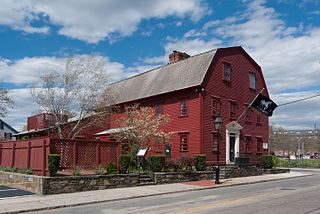
Rhode Island, officially the State of Rhode Island, is a state in the New England region of the Northeastern United States. It is the smallest U.S. state by area and the seventh-least populous, with slightly fewer than 1.1 million residents as of 2020, but it is the second-most densely populated after New Jersey. It takes its name from the eponymous island, though most of its land area is on the mainland. Rhode Island borders Connecticut to the west, Massachusetts to the north and east, and the Atlantic Ocean to the south via Rhode Island Sound and Block Island Sound; it also shares a small maritime border with New York. Providence is its capital and most populous city.
Providence often refers to:

Warwick is a city in Kent County, Rhode Island, the third largest city in the state with a population of 82,823 at the 2020 census. It is located approximately 12 miles (19 km) south of downtown Providence, Rhode Island, 63 miles (101 km) southwest of Boston, Massachusetts, and 171 miles (275 km) northeast of New York City.

Providence Plantations was the first permanent European American settlement in Rhode Island. It was established by a group of colonists led by Roger Williams and Dr. John Clarke who left Massachusetts Bay Colony in order to establish a colony with greater religious freedom. Providence Plantations became the Colony of Rhode Island and Providence Plantations, which became the State of Rhode Island after the American Revolution.

The Colony of Rhode Island and Providence Plantations was one of the original Thirteen Colonies established on the east coast of America, bordering the Atlantic Ocean. It was founded by Roger Williams. It was an English colony from 1636 until 1707, and then a colony of Great Britain until the American Revolution in 1776, when it became the State of Rhode Island.
West End most commonly refers to:
Greystone or Graystone may refer to:

The history of Rhode Island is an overview of the Colony of Rhode Island and Providence Plantations and the state of Rhode Island from pre-colonial times to the present.

British America comprised the colonial territories of the British Empire in the Americas from 1607 to 1783. These colonies were formally known as British America and the British West Indies before the Thirteen Colonies declared their independence in the American Revolutionary War (1775–1783) and formed the United States of America.

The following is an alphabetical list of articles related to the U.S. state of Rhode Island.
Rhode Island is a constituent state of the United States.

The following outline is provided as an overview and topical guide to the U.S. State of Rhode Island:
Payne House may refer to:
Jonathan Nichols may refer to:

Daniel Abbott was a deputy governor of the Colony of Rhode Island and Providence Plantations. He was the son of Daniel and Margaret (White) Abbott of Providence in the Rhode Island colony and was called Daniel Abbott, Jr. when he was made a freeman of Providence in 1708. He served on the Providence Town Council in 1713, and the same year he served as Deputy which he held numerous times until the year of his death. In 1720, he was Clerk of the Assembly, and from 1737 to 1738 he was Speaker of the House of Deputies. In 1738, he was elected as Deputy Governor of the colony and served for two one-year terms under Governor John Wanton.

Joseph Whipple Jr. was a wealthy merchant in the Colony of Rhode Island and Providence Plantations, and a Deputy Governor of the colony.

The Rhode Island Royal Charter provided royal recognition to the Colony of Rhode Island and Providence Plantations, approved by England's King Charles II in July 1663. It outlined many freedoms for the inhabitants of Rhode Island and was the guiding document of the colony's government over a period of 180 years.
Thomas Angell (c.1616–1694) was one of the four men who wintered with Roger Williams at Seekonk, Plymouth Colony in early 1636, and then joined him in founding the settlement of Providence Plantation in what became the Colony of Rhode Island and Providence Plantations. He was a minor at the time of his arrival, but his name appears on several of the early documents related to the settlement of Providence. In the early 1650s, he became active in the affairs of the town, serving as commissioner, juryman, and constable. In 1658, he began his service as the Providence Town Clerk and held this position for 17 years. He wrote his will in 1685, dying almost a decade later in 1694, leaving a widow and many grown children. Angell Street on Providence's East Side is named for him.
John Throckmorton, Gent. (1601–1684) was an early settler of Providence Plantation in what became the Colony of Rhode Island and Providence Plantations, and he was one of the 12 original proprietors of that settlement. He emigrated from Norfolk, England to settle in Salem in the Massachusetts Bay Colony, but religious tensions brought about his removal to Providence.

William Greene Jr. was the second governor of the state of Rhode Island, serving in this capacity for eight years, five of which were during the American Revolutionary War. From a prominent Rhode Island family, his father, William Greene Sr., had served 11 terms as a colonial governor of Rhode Island. His great-grandfather, John Greene Jr. served for ten years as deputy governor of the colony, and his great-great-grandfather, John Greene Sr. was a founding settler of both Providence and Warwick.
This page is based on this
Wikipedia article Text is available under the
CC BY-SA 4.0 license; additional terms may apply.
Images, videos and audio are available under their respective licenses.










